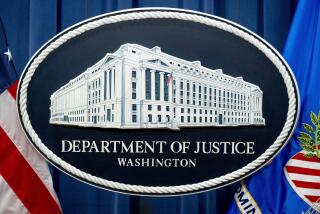Consultants for Northrop Were Big Spenders : Probe Uncovers Outlays of $90,000 Per Month to Entertain S. Korea Officials
- Share via
Two flamboyant former nightclub owners that Northrop hired as consultants to represent it in South Korea spent $90,000 a month in the mid-1980s entertaining South Korean government officials at saloons, hostess bars and Korean-style geisha houses in an effort to sell the firm’s F-20 jet fighter.
The disclosure, along with many new allegations about Northrop’s South Korean business dealings, is contained in a lengthy report by the Washington law firm of Jones, Day, Reavis & Pogue. Northrop’s board hired the firm to conduct an internal corporate investigation, and a portion of the report has been obtained by The Times.
Northrop’s Korean business deals are under investigation by a federal grand jury in Los Angeles as well as by the House Energy and Commerce Committee. A committee source said Chairman John D. Dingell (D-Mich.) has been attempting to obtain the report, but Jones Day has declined to provide it.
The two consultants were Jimmy Shin, the former owner of a Honolulu nightclub where police once conducted a gambling raid, and the late Park Chong Kyu, a former South Korean government official who ran his own nightclub in Seoul.
The Jones Day report was based on a two-day interview with Shin in Hawaii in January, 1987. The interview took place at the offices of George Hong, a prominent Honolulu attorney who represented Shin at the time.
A Northrop spokesman said he could not respond to questions about the Jones Day report because he had not seen it. The report apparently was delivered to the board but was not made available to Northrop’s management. Jones Day declined to comment on the report.
According to the report, Shin complained that he had to spend $600 a night per person to win friends for Northrop in South Korea, whereas he was entitled under his Northrop consulting contract to charge the aerospace firm only $200 for each evening of entertainment.
The report does not indicate the cumulative amount Shin and Park spent wining and dining South Korean military officials, but it says that the lobbying campaign was conducted for at least several years, starting in 1984.
In addition to his expenses, Shin was paid $8,500 a month as a Northrop consultant and Park was paid $6,500 a month, according to other documents and sources.
Went to Hostess Bars
The Jones Day report quotes Shin as saying that he was assigned the job of lobbying low-level South Korean officials while Park went after higher-ranking officials.
“Entertainment included dinners, visits to Geshung houses and at saloons which are, in the vernacular, hostess bars,” according to the report of the Shin interview.
Hong, Shin’s attorney, said Shin “frequently incurred expenses of as much as $600 for each guest in entertaining them in Geshung houses and that in many cases, both (Northrop Vice President James) Dorsey and (Northrop Vice President Welko) Gasich had attended these functions.” (“Geshung houses” apparently refers to kisaeng establishments, which are similar to Japanese geisha houses.)
The most costly entertainment the consultants provided involved a two-day meeting with Gasich and Dorsey in Tokyo in 1984, Shin told the attorneys, when “the parties attended a hostess club in the Rapongi Private Members Club in Tokyo and that he (Shin) was staggered by the cost which approximated $1,000 per person.”
It was at that meeting that Park proposed to Dorsey and Gasich that “he needed a lobby fund of approximately $5 million as a payoff fund for various people,” Shin initially told Jones Day attorneys. He said Park proposed a deal for Northrop to build a hotel as a cover for paying the money, which he said would then presumably be used to pay off South Korean President Chun Doo Hwan and others.
Shin made that statement after his attorney had left the meeting during which the interview was conducted, according to the Jones Day report. When the attorney returned and learned what Shin had said, he took his client aside for a private consultation. Then Shin recanted the statement. Shin later described the hotel deal as simply a “scheme” to get money to Park for his own purposes.
Secret Agreement
In either case, Shin alleges that a $6.25-million deal Northrop signed in 1984 to build a hotel in Seoul was a bogus venture. Northrop has claimed that the hotel deal was a legitimate business venture to help the Koreans finance the purchase of the F-20s but that it was defrauded in the deal. It has filed suit in South Korea in an effort to recover its investment from Park’s survivors and former associates.
Shin played a pivotal role in Northrop’s F-20 marketing activities in Korea, but he also had a secret agreement with one of Park’s organizations. He alleged in the Jones Day interview that Dorsey knew about the that secret deal.
Northrop had agreed to pay one organization controlled by Park up to $55 million in sales commissions if it successfully sold the F-20 to the South Korean air force. Park then signed a secret deal with Shin that would have given him 25% of the commissions. (But Northrop did not find a buyer for the F-20, and the plane never went into production.)
Shin alleged in the interview that Dorsey not only knew about the secret deal but helped draft the agreement.
Under Northrop’s corporate policies, such an agreement probably would not have been permitted. The company has said it was unaware of Shin’s secret deal with Park at the time it was made.
More to Read
Inside the business of entertainment
The Wide Shot brings you news, analysis and insights on everything from streaming wars to production — and what it all means for the future.
You may occasionally receive promotional content from the Los Angeles Times.











